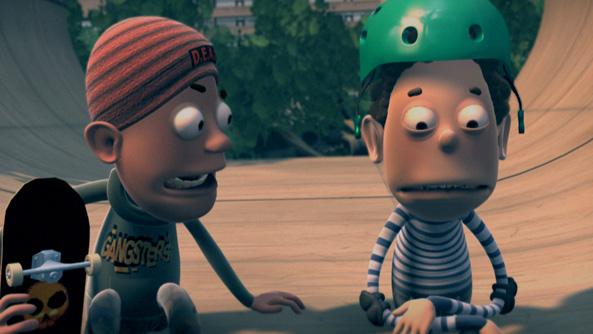In theory, the task of making films for children and teens is destined to fail from the beginning.
On the one hand, you have your inarticulate, snot-nosed and pimply, candy-chomping, mobile-yakking, indifferent audience that only very rarely pay for their own movie tickets. On the other hand, you have their parents who – rattled with guilt and thwarted self-fulfilment, hair-triggered from sex deprivation and random train delays – just want the best for their kids. In other words, material for children and teens is a shark-infested sea and maelstroms appear where you least expect them: the films are either too violent or too boring. Either they are not up to the kids’ level or they are way too raw and explicit.
This dilemma is not just a Danish phenomenon, I’m sure. Filmmakers the world over face the same challenge. Broadly speaking, if a bit hackneyed, as adults and parents we all wish good children’s films could be more like the perfect child we always wanted but never had: quiet, smart, well mannered and just a little bit sassy every once a while.
But the interesting question is: Who are children’s films really for? Kids or adults? If the latter, we should produce more glossy pictures of kids in knee pants and wellingtons bounding through golden wheat fields. That makes us grownups feel good and we are once again reassured that childhood is a pleasant land where the sun always shines.
But, what if children’s films should reflect the target group the way they really are? Then it’s a completely different picture. Kids in real life aren’t quiet or nice or delicate and poetic. They tend to be loud, self-assertive and sometimes really annoying. That way, they are a lot like grownups.
The appropriate question then is: What films should we make for a group of people that look like us – except they still eat their boogers and think the moon is made of cheese.
There are no rules for that, of course. But there are various approaches to the material. You can either view children and teens as a vulnerable population group that has to be protected from the world and that you can mould into upstanding citizens through the power of cinema.
Or you can look at children and teens as competent, adaptable moviegoers who have fresh brains and a tremendous capacity to make sense of the world they inhabit.
I personally believe in the last approach.
The animation "Terkel in Trouble" is one of the most popular Danish children’s films of the last decade. Any Dane can quote lines from it. The film managed to close a generation gap between parents and their kids, because it was direct and fresh in a way that made the audience laugh and drop their jaws, too, regardless of age.
Despite its tough, provocative style, the film rose to the top as one of the most seen children’s films in Danish cinemas ever.
Terkel is an interesting example, because it challenges and pushes boundaries. If we consider cinema to be a dynamic and innovative art form, those are essential qualities.
In my daily work, I try to think of children’s and teen films as a lab where anything goes. A youthful audience aren’t prejudiced and their eyes are still open. I would argue that we have our greatest, most significant movie experiences from the time we are six or seven to seventeen or eighteen. It’s interesting how kids that age don’t distinguish between films for kids or adults but simply between good films and bad films – just like we do now.
So, my focus is avoiding the predictable and the obvious. Countless children’s films are shaped around themes based on well-intentioned ideas, whose creators thought too much about the target group and too little about the creative process. Far too often, children’s films have stories that point to the adult world and the problems of adult life, because the film is conceived as an instrument for helping its audience process a difficult theme or a tough problem – death, divorce, et cetera.
My position is that good children’s films are good grownup films, too. This means that they don’t talk down to the audience, they don’t censor their own language or aesthetics, and they don’t compromise on the story.
It may sound utopian to expect a film to work for two target groups at once without compromising. And yet. When Moviefone – the biggest American film website – published its 50 best films of 2010, "Toy Story 3" was in first place and "How to Train Your Dragon" was tenth.
That speaks volume about the potential of making – good – children’s films.
Rasmus Horskjær
DFI film commissioner since September 2010. Holds a degree in journalism. Has worked for some years in youth programming for the national broadcaster DR, writing and directing several classic Danish satires with great appeal to young people.

